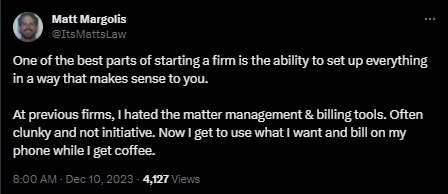When I think about my least favorite cases, it’s generally because the client is terrible in some crucial way.
I remember the day I got my own all-time least favorite case. It was about 20 years ago, and my day started with a simple matter in Williamson County General Sessions Court. While I was waiting for my case, there was a dramatic hearing on the docket right before mine.
A contractor had filed a pro se collection lawsuit, and, during the trial, the contractor came with a wild energy, ready to fight. He got into an argument with the lawyer on the other side, threatened the homeowners, had no documents to support his case, and ended the trial by yelling at the Judge (who had ruled against him and told him to hire a lawyer and appeal it, if he thought the decision was wrong).
As the contractor stormed out of the courtroom, yelling at everybody, I remember thinking “I would hate to be that guy’s lawyer.”
In the two hours that it took for me to get lunch and make it back to my office in Nashville, my boss had a new case for me. Yes, it was that guy. He had told his cousin about how he had gotten screwed over by a biased judge and needed a lawyer for the appeal in Circuit Court. The cousin–a client of my firm–recommended my boss, who handed the file directly to me.
I told my boss what I saw in court that day and begged him not to take the case.
I’ll spare you all the details, but that client never got less angry and more reasonable. He was mad at me for asking for paperwork and proof. He didn’t understand why we needed evidence. He was mad at the bills we sent him. He refused to participate in any meaningful aspect of the process. He hated me and questioned everything I said to him about the case. Settlement was never an option. We were going to fight this to the end. My boss took a “hands off” approach.
In the end, he showed up for the trial in Circuit Court, but it was only slightly less wild than the first trial. We lost spectacularly, and my memories of that trial are as vivid to me as my memories of my wedding day and the births of my children.
I tend to think about that case during the holiday season, because, after that trial, I went directly to a real estate agent’s elaborate holiday party in a 6,000 square foot model home in Brentwood (this was the good times, pre-Great Recession). I drowned my PTSD in eggnog.

I was reminded of it all, when I saw Matt Margolis‘ tweet about how better the practice of law can be when you get to choose your clients. Matt recently started his own law firm, Margolis PLLC.
That may be the greatest benefit of running your own firm. At my old firm, you got handed cases, whether you wanted them or not. Some clients are unreasonable. Some have bad claims. Some can’t afford a lawyer. In a big firm, often you don’t always have a choice. It’s too bad, though, because taking on bad cases or bad clients is an easy way to create unhappy lawyers.
Don’t get me wrong: In your own firm, you will absolutely take on bad cases and bad clients, but it’s different when it’s your own choice. At worst, it’s a lesson you (hopefully) learn from. Having recently closed the last of what I referred to as “The Sinister Seven,” I can assure you that it’s a learning process (ask me about the sequel, “The Terrible Two”). Taylor Swift and I both can benefit from some honest self-reflection.

After three plus years of running my own firm, you would be shocked at how picky I have become (I call it The Client Decision Tree, and I’ll do a full post on that soon). Some lawyers see those initial client calls like a job interview, and I do too: But it’s usually me doing the vetting.
I refer out about three times as many cases than I accept, and it’s been a revelation. Some clients simply make things more difficult, and that can impact your entire practice.
To this day, my engagement letters say “the attorney-client relationship is one of mutual trust and confidence,” and it’s not just filler to distract the client from the hourly rate and retainer. If I get a sense from a potential client that she doesn’t respect my role, the legal process, or trust me (i.e. listen to me), that client never gets an engagement letter.
Life is too short and reputations are too fragile to do work for clients who aren’t a good fit with my firm. Say yes to too many bad clients, and you’ll find you have less time, patience, and space for the awesome clients.







